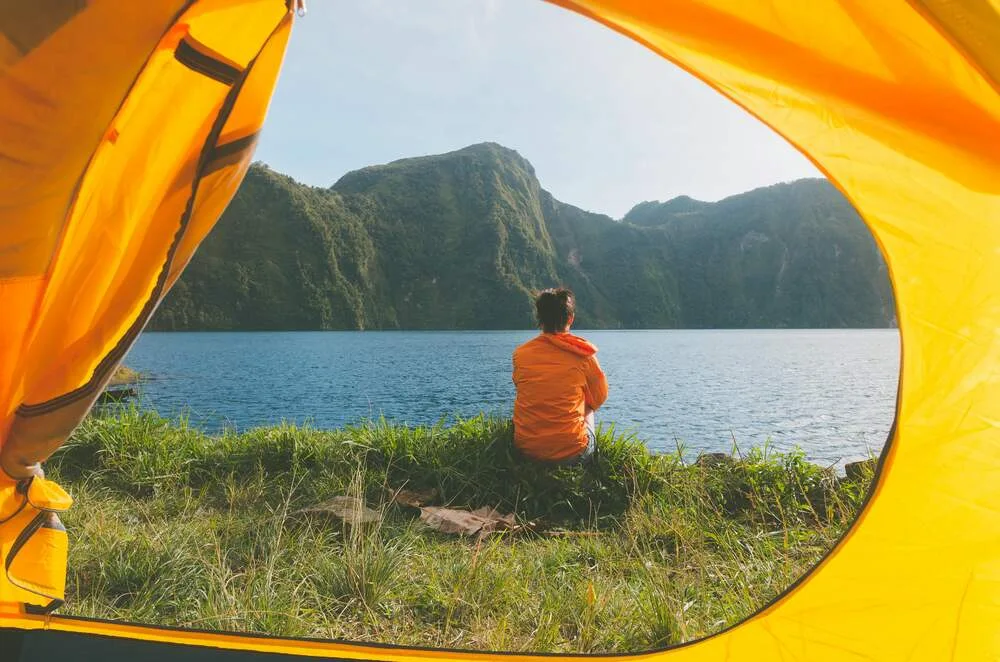Budget camping doesn’t mean missing out! Imagine this: a crackling campfire under a canopy of stars, the gentle lull of a nearby stream, and the scent of pine needles in the air. You’ve escaped the daily grind to reconnect with nature, and the best part? It didn’t break the bank. Whether you’re dreaming of quick car camping getaways or venturing out on backpacking trips, these tips will help you save in 2024.
Camping offers an incredibly affordable way to unwind, create lasting memories, and immerse yourself in the beauty of the outdoors. Let’s dive into how you can find the camping gear you need and create amazing camping adventures on a budget.
Camping Gear on a Budget
Getting started doesn’t mean buying everything at once. Here’s how to find what you need without emptying your wallet.
- Borrowing Gear: The perfect solution for those first few adventures! Ask friends, family, or neighbors if they’re willing to loan you essentials like tents, sleeping bags, sleeping pads, backpacks, and lanterns. You might be surprised what turns up, and it lets you try before you buy.
- Buy Gradually: Start with the absolute necessities – a tent that will keep you dry, sleeping bags rated for the temperatures you’ll encounter, a couple of headlamps, and a basic cooler for your food. Prioritize the essentials, and as your budget allows, you can upgrade or add the fun extras like camp chairs and portable stoves.
- Shop Secondhand: Find incredible camping gear at bargain prices! Garage sales, thrift stores, and online marketplaces like REI Garage Sales are treasure troves of gently-used gear. Inspect items thoroughly for any damage, especially camp stoves, but be ready to be amazed! A $30 name-brand tent at a thrift store? It happens!
- Repurpose What You Have: Think outside the ‘camping gear’ box! Before spending money, see what you already own. Old pans, blankets, and pillows can work perfectly for those first few trips. Could a tarp you already have become a temporary rain shelter? That yoga mat in the closet might add padding under your sleeping bag. Get creative!
Lowering Trip Costs For Campers
Smart choices on the trip itself mean more money for future adventures! Let’s look at ways to save.
- Share the Load: Team up with friends or family! Pool your resources – maybe one person has a tent, another a propane stove, and someone else has a big cooler. Not only does this save money, but it also makes camping more fun and less work. Plus, you may pick up some valuable skills from more experienced campers.
- Budget-Friendly Meal Planning: Keep it simple and delicious! Think campfire favorites like hot dogs, foil-packet meals, or one-pot pasta dishes. Plan ahead, do as much prep at home as possible (chopping veggies, measuring ingredients), and don’t forget those spices! A little flavor goes a long way in making basic meals feel special.
- Buy Groceries Wisely: Resist the temptation of pricey roadside stores or campground shops. Stick to your regular supermarket for the best deals on food and supplies. Having a meal plan in place helps you avoid impulse buys and overspending.
Smart Campground Choices
Where you camp has a big impact on the cost. Opt for simpler sites, off-peak times, and explore beyond national parks to save big.
- Campgrounds with Minimal Amenities: Forgo the pools and fancy shower blocks in favor of sites with just the basics. Think pit toilets, a water source, and maybe a picnic table. You’ll enjoy a quieter, more natural experience, and your wallet will thank you.
- Camp During Off-Season: Avoid summer weekends and holidays! Fewer crowds mean lower rates, easier reservations, and more peaceful trails. Camping in spring, fall, or even on weekdays can feel like having the whole campground to yourself .
- Camp Outside of National Parks: State parks, national forests, and other public lands offer breathtaking scenery and diverse camping options. You’ll dodge those hefty national park entry fees while potentially discovering a new favorite spot.
- Stay Close to Home: Save those gas dollars! There are likely fantastic campgrounds within a short drive. Not only does this cut down on travel costs, but it also opens up the possibility of quick and easy weekend getaways.
Saving Beyond the Camping Gear
Don’t forget these easy saving tricks that add up over time!
- The Power of Free: Nature provides endless entertainment! Hike, swim, birdwatch, stargaze, tell stories around the campfire, or try your hand at nature journaling. These activities cost nothing but enhance any camping trip. Be sure to check the campground calendar too – there might be fun and free ranger-led programs.
- Start a Camping Fund: Even small change adds up over time! Set up a dedicated jar in your kitchen for adventure savings. Round up change after shopping, toss in a few dollars each paycheck, and watch it grow.
- Request Practical Camping Gifts: Don’t shy away from suggesting useful gear items for birthdays or holidays. Loved ones will appreciate knowing their gift will get used and help you get outdoors more often.
- Join KOA Rewards (or Similar Programs): Rack up points with each stay, often earning you discounts or free nights for future use. This is a great long-term saving strategy..
- Seek Out Campground Deals: Many campgrounds offer discounts for off-season or early bookings. Look directly on their websites to find those special offers and snag a great deal.
Tips for Budget Backpacking Trips
Love the idea of venturing deeper into the wilderness with everything on your back? Backpacking can be incredibly affordable! Here’s how to save on essential backpacking gear:
- Gear Smart: Don’t sweat every ounce to start. Look for sales on last season’s gear or check out used options. Synthetic sleeping bags are often cheaper than down and still keep you warm. A simple foam pad is budget-friendly and reliable.
- Plan Ahead: Meal planning is key to avoid buying too much food and carrying extra weight. Rent backpacking gear if you only go out occasionally, or borrow from friends to try it out.
- Simple Comforts: Your clothes can double as a pillow! Use a trash compactor bag to line your pack, keeping gear dry on the cheap. A DIY foil windscreen boosts your stove’s efficiency, saving you fuel.
- Take Care: Make your gear last! Store your tent dry, clean your cook set after use, and patch any wear and tear. A little TLC goes a long way in saving you money down the road.
Camping Gear Starter Guide
| Item | New Price (Approx.) | Used Option | Repurpose from Home? | Buy Gradually? |
| Tent | $100+ | Garage Sales, Thrift Stores, REI | Sometimes | Absolutely! |
| Sleeping Bag | $50+ | Thrift Stores, Check Temperature Rating! | Blankets and Pillows | Essential |
| Cooler | $50+ | Garage Sales, Check Seals and Insulation | Old Coolers are fine! | Essential |
| Camp Stove | $50+ | Borrow for First Trip, Garage Sales | – | Upgrade later |
| Camp Chair | $40+ | Garage Sales, Sometimes optional | Kitchen Chairs | Fun Extra |
| Sleeping Pad | $20+ | Thrift Stores (Closed-cell foam) | Yoga Mat? | Upgrade Later |
Bonus Tips for Budget-Friendly Camping and backpacking
- DIY Gear: Can’t find that perfect camp chair cheap? With a few tools and online tutorials, you might build your own! Search for foldable camp chair plans, or get creative with lightweight, durable materials. Don’t want to buy a camp stove, make your own with this tutorial.
- Camp Cooking Upgrade: Foil-packet meals are awesome, but a cast-iron skillet opens up a world of options. Look for one at thrift stores or garage sales. Don’t forget to season it well before your first trip!
- Become a Fire Master: Not just for warmth, a campfire is your kitchen too! Learn different fire-building techniques, how to cook over coals, etc. This saves on fuel if you have a stove and adds major camp-charm points.
- Gear Maintenance: That $30 thrift-store tent is a steal…but only if it lasts! Learn how to clean, patch, and properly store your gear to make your budget buys last for many adventures.
- Free Learning: Your local library, outdoor stores, and even online groups often have free skill-building workshops. Learn about things like packing a backpack efficiently, basic wilderness first aid, or even campfire cooking techniques!
Conclusion
Camping doesn’t require the latest and greatest gear. Focus on the experiences – the fresh air, the camaraderie, and the simple joys of connecting with nature. Start with these smart tips, embrace a DIY spirit, and soon you’ll be a seasoned budget-camping pro! Get ready for endless adventures that are both fulfilling and affordable. What are you waiting for? Start planning your first budget camping trip today!
The Best Cheap Camping Gear for New Campers: FAQ
Q: How can I save money on camping gear? A: Think used! Check out garage sales, thrift stores, and online marketplaces for pre-loved tents and camp stoves. If you’re only going a few times a year, consider renting or borrowing essentials from friends and family. Keep an eye out for sales and discounts, both online and at your local outdoor stores.
Q: What are some affordable camping options? A: Go off-season! Campgrounds often have lower rates outside of summer and holidays. Camp closer to home to save on gas. And remember, sometimes the simplest sites are the most rewarding – look for those with just the basics. You can even try DIY camping by making some of your own gear.
Q: How can I plan a budget-friendly camping trip? A: Planning is key! Pack your own meals and snacks to avoid pricey stops on the road. Sharing the trip (and the costs!) with friends or family makes things even cheaper. Check the weather, and pack only what you need so you don’t end up buying something you forgot at the last minute.
Q: Are there any free or low-cost camping options? A: Absolutely! Many public lands offer free “primitive” campsites. These usually have the basics like a cleared tent spot, fire pit, and maybe an outhouse. Some large rural properties like farms might even offer free spots, so it’s worth looking around.
Q: How can I make camping more affordable for future trips? A: The big stuff – tent, sleeping bag, etc. – is your main investment. After that, each trip gets cheaper! You can slowly add new gear as your budget allows, which makes camping even more enjoyable over time.

